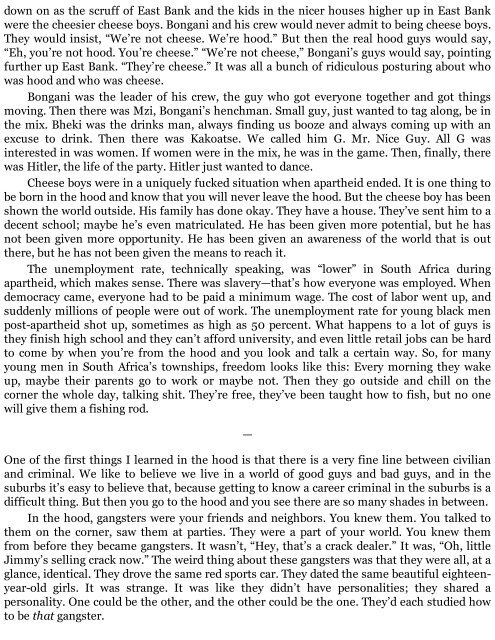You also want an ePaper? Increase the reach of your titles
YUMPU automatically turns print PDFs into web optimized ePapers that Google loves.
down on as the scruff of East Bank and the kids in the nicer houses higher up in East Bank<br />
were the cheesier cheese boys. Bongani and his crew would never admit to being cheese boys.<br />
They would insist, “We’re not cheese. We’re hood.” But then the real hood guys would say,<br />
“Eh, you’re not hood. You’re cheese.” “We’re not cheese,” Bongani’s guys would say, pointing<br />
further up East Bank. “They’re cheese.” It was all a bunch of ridiculous posturing about who<br />
was hood and who was cheese.<br />
Bongani was the leader of his crew, the guy who got everyone together and got things<br />
moving. Then there was Mzi, Bongani’s henchman. Small guy, just wanted to tag along, be in<br />
the mix. Bheki was the drinks man, always finding us booze and always coming up with an<br />
excuse to drink. Then there was Kakoatse. We called him G. Mr. Nice Guy. All G was<br />
interested in was women. If women were in the mix, he was in the game. Then, finally, there<br />
was Hitler, the life of the party. Hitler just wanted to dance.<br />
Cheese boys were in a uniquely fucked situation when apartheid ended. It is one thing to<br />
be born in the hood and know that you will never leave the hood. But the cheese boy has been<br />
shown the world outside. His family has done okay. They have a house. They’ve sent him to a<br />
decent school; maybe he’s even matriculated. He has been given more potential, but he has<br />
not been given more opportunity. He has been given an awareness of the world that is out<br />
there, but he has not been given the means to reach it.<br />
The unemployment rate, technically speaking, was “lower” in South Africa during<br />
apartheid, which makes sense. There was slavery—that’s how everyone was employed. When<br />
democracy came, everyone had to be paid a minimum wage. The cost of labor went up, and<br />
suddenly millions of people were out of work. The unemployment rate for young black men<br />
post-apartheid shot up, sometimes as high as 50 percent. What happens to a lot of guys is<br />
they finish high school and they can’t afford university, and even little retail jobs can be hard<br />
to come by when you’re from the hood and you look and talk a certain way. So, for many<br />
young men in South Africa’s townships, freedom looks like this: Every morning they wake<br />
up, maybe their parents go to work or maybe not. Then they go outside and chill on the<br />
corner the whole day, talking shit. They’re free, they’ve been taught how to fish, but no one<br />
will give them a fishing rod.<br />
—<br />
One of the first things I learned in the hood is that there is a very fine line between civilian<br />
and criminal. We like to believe we live in a world of good guys and bad guys, and in the<br />
suburbs it’s easy to believe that, because getting to know a career criminal in the suburbs is a<br />
difficult thing. But then you go to the hood and you see there are so many shades in between.<br />
In the hood, gangsters were your friends and neighbors. You knew them. You talked to<br />
them on the corner, saw them at parties. They were a part of your world. You knew them<br />
from before they became gangsters. It wasn’t, “Hey, that’s a crack dealer.” It was, “Oh, little<br />
Jimmy’s selling crack now.” The weird thing about these gangsters was that they were all, at a<br />
glance, identical. They drove the same red sports car. They dated the same beautiful eighteenyear-old<br />
girls. It was strange. It was like they didn’t have personalities; they shared a<br />
personality. One could be the other, and the other could be the one. They’d each studied how<br />
to be that gangster.
















